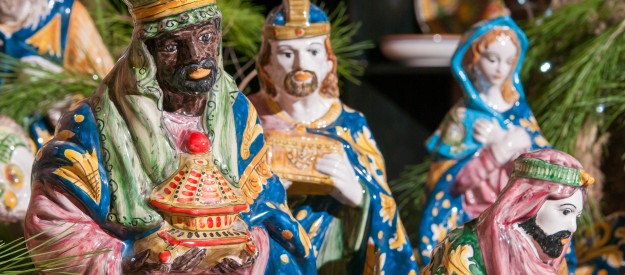"We are losing our attitude of wonder, of contemplation, of listening to creation and thus we no longer manage to interpret within it what Benedict XVI calls 'the rhythm of the love-story between God and man.'"
+ Pope Francis
Epiphany and the pope’s eco-address to teachers

Addressing the Italian Catholic Primary School Teachers’ Association today as part of their 21st gathering, Pope Francis stressed three themes that will be front and center in this Sunday’s Feast of the Epiphany. They’re also three important themes for Catholics engaged in environmental protection.
“I would like to offer you three points for reflection and engagement: the culture of encounter, the alliance between school and family, and ecological education.”
Reading the address, one cannot help but find within it the searching magi who scour the cosmic order seeking the promised Messiah of Israel—and all that this implies. When they find this Messiah, they find him in the midst of his human family—a person's first and foremost experience of love and encounter.
First of all, I thank you for the contribution you give to the Church’s commitment to promoting the culture of encounter. … Christian teachers, whether they work in Catholic schools or in state schools, are called to stimulate in the pupils the openness to the other as a face, as a person, as a brother and sister to know and respect, with his or her history, merits and defects, riches and limits. The challenge is to cooperate to train young people to be open and interested in the reality that surrounds them, capable of care and tenderness.
Here the magi are examples—those mysterious king/astrologer/wise men “from the east,” as St. Matthew tells us, who seek to encounter Christ, and who are welcomed by Mary and St. Joseph. In all, these foreigners (and, by extension, pagans), are not only open to an encounter but are also received by Mary and Joseph, who are “open and interested in the reality that surrounds them, capable of care and tenderness.”
Matthew, writing to a predominately Jewish audience, is the only evangelist that tells us the story of the magi. It's as if he's eager to stress to his fellow Jews (for indeed that is how Matthew would have seen himself) that an openness to the foreigner is a central element of the birth of the Messiah. God comes for all, and we should thus be open to all.
Second, the pontiff calls for an
educational alliance between the school and the family. We all know that this alliance has long been in crisis, and in some cases completely broken. Once upon a time there was significant mutual reinforcement between the stimuli given by teachers and those given by parents. Today the situation has changed, but we can not be nostalgic for the past. We must take note of the changes that have affected both the family and the school, and renew the commitment to constructive collaboration—or rather, rebuild the alliance and the educational pact—for the benefit of children and young people.
This relationship between the school and the family—the latter being the foundation of all relationships—becomes all the more critical with the third element of the pontiff’s talk: ecological education. By this, Pope Francis does not mean merely a technical education. Rather, following the direction of Laudato Si’, the pontiff stresses an integral education.
It is about educating to a lifestyle based on an attitude of care for our common home, which is creation. A lifestyle that is not schizophrenic, that for instance takes care of animals in extinction but ignores the problems of the elderly; or that defends the Amazon forest but neglects workers’ rights to a just wage, and so on. This is schizophrenia. The ecology in which we must educate has to be holistic. And above all, education must aim at a sense of responsibility: not to transmit slogans that others should implement, but to inspire the pleasure of experiencing an ecological ethic, starting from choices and gestures in daily life. A style of behaviour that in the Christian perspective finds meaning and motivation in the relationship with God the creator and redeemer, with Jesus Christ, centre of the cosmos and of history, and with the Holy Spirit, source of harmony in the symphony of creation.
And so, Pope Francis begins with stressing the need to teach children to be fully human—to embrace a life open to encountering others—then moves to honoring and supporting the family, as the magi did. And he concludes with the critical reality of teaching our children to think and thrive with all creation, and all people and social issues, in mind.
This is the true journey of education. It is the journey toward wisdom. It is the way toward unity and peace. Like those wise men of old, who found in their studies of the cosmic order a way to discover the Christ, we, too, must journey ourselves, and teach our children likewise.
For it will only be through reaching outside of ourselves—to God and neighbor—that you and I and all mankind can encounter the truth that created all, elevates all, and saves all. And that encounter, the Holy Father tells us, must be integral to the very nature of all education, for it is integral to the very nature of all life.


















